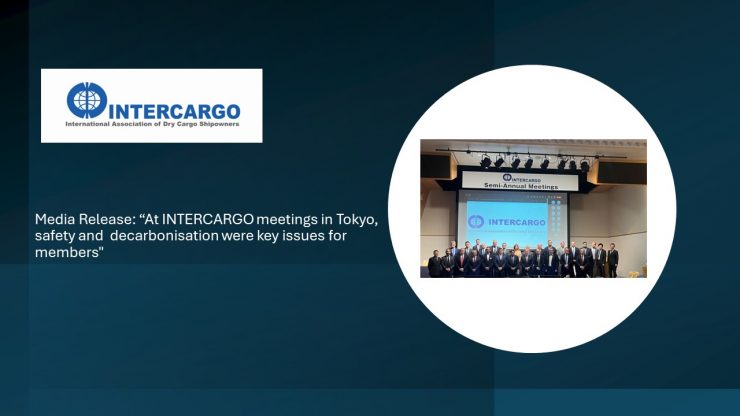Media Release – 31 May 2024
“At INTERCARGO meetings in Tokyo, safety and
decarbonisation were key issues for members”
The Association that represents dry bulk shipping is warning that the Carbon Intensity Indicator (CII) needs to be changed
31 May 2024, London: INTERCARGO, the International Association of Dry Cargo Shipowners, met in Tokyo last week for its Semi-Annual Meetings, and high on the agenda were quality, sustainability, GHG emissions’ reduction, and particularly the CII rating system.
The location of Tokyo was chosen specifically to highlight the importance of Japan to the dry bulk sector. Japanese economic growth has contributed hugely to trade in dry bulk, a sector that has supported one of the world’s largest network of shipbuilders, with many shipyards across Japan including the world’s leading ship builders and designers of dry bulk vessels. Japanese ship owners have been prominent players in supplying the world’s economy with dry bulk products such as iron ore, coal, raw materials and grain.
Numerous members and guests from both Japan and abroad attended the Association’s functions. INTERCARGO’s Executive Committee and Technical Committee discussions focused on issues affecting the dry bulk sector. INTERCARGO’s members represent about one-third of the global dry bulk fleet tonnage. While they are supportive of the IMO’s decarbonisation aims, they expressed serious concerns that the CII, in its current form, will unfairly penalise the sector.
Dimitrios Fafalios, Chairman of INTERCARGO said: “The issue of the CII again featured heavily in discussions with members at our meetings in Tokyo. INTERCARGO’s members feel very strongly that the CII, in its current format, needs a fundamental reconsideration to account for the operating conditions in our sector.”
Mr Fafalios added: “While we are, of course, supportive of the IMO’s environmental aims, they must be enforced in a fair and equitable manner across the maritime spectrum. They also need to be applied in way that is not potentially damaging to the shipping industry, as well as to avoid the wider adverse effects on economies and on end consumers.”
Also prominent on the agenda of INTERCARGO in Tokyo were discussions on:
- safety & quality operations;
- INTERCARGO’s messaging via ESG;
- recommendations on Port State Controls; and
- macro-economic impacts on the dry bulk shipping, such as conflicts leading to re-routing of vessels and increased insurance costs.
The next calendar dates for INTERCARGO’s members are the organisation’s Annual General Meeting, Executive Committee and Technical Committee meetings in London on 24-25 October 2024.
– END –
About INTERCARGO
International shipping is vital for the global economy and prosperity as it transports approximately 90% of world trade. The dry bulk sector is the largest shipping sector in terms of number of ships and deadweight. Dry bulk carriers account for 43% of the world fleet (in tonnage) and carry an estimated 55% of the global transport work. Please view INTERCARGO’s messaging via ESG here: https://www.intercargo.org/esg-review-2024/
The International Association of Dry Cargo Shipowners (INTERCARGO) unites and promotes quality dry bulk shipping, bringing together 250 forward thinking companies from 30 countries. INTERCARGO convened for the first time in 1980 in London and has been participating with consultative status at the International Maritime Organization (IMO) since 1993. INTERCARGO provides the forum where dry bulk shipowners, managers and operators are informed about, discuss, and share concerns on key topics and regulatory challenges, especially in relation to safety, security, the environment, and operational excellence. The Association promotes its members’ positions to IMO, as well as to other shipping and international industry fora, having free and fair competition as a principle.
For further information please contact: info@intercargo.org



